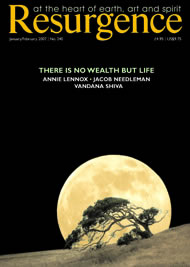Death is part of life – it affects us all, and yet we never seem to be ready for it. Several times now, when loved ones have departed from my life, I have felt the funeral ceremony to have been inadequate or, at least, inappropriate. If only we’d had access to a book like this. It is absolutely full of inspiration on how to really celebrate the life of a loved one. From willow coffins and bamboo urns, candlelight and lanterns, to the use of photographs and favourite music, the book overflows with ideas on how to connect with the life of the deceased through the ritual and ceremony of the funeral. But there is much more in these pages: discussion of legal issues such as burials on private land and how to register a death,
contact details for woodland burial sites and alternative
coffin-makers, bereavement services and even the laying-out of the body. All these services can be undertaken simply and respectfully by the family and friends of the dear-departed. Warmly recommended. • LH
ORGANIC PLACES TO STAY IN THE UK Linda Moss
Green Books, UK, 2006, £10.95
Planning our visit to London was proving more difficult than anticipated. We didn’t want to stay in another dreary hotel, preferring somewhere a little more interesting and unusual. When Organic Places to Stay in the UK landed on my desk and literally fell open on the entry for London, I knew luck was on our side! We stayed in a charming Regency terrace in Primrose Hill cared for by Resurgence-reading hosts. With our own en suite room (at extremely reasonable rates), delicious organic breakfasts and easy accessibility to central London, it was the perfect place for a city break. How useful, then, to have a whole book full of delightful hotels, guest houses and cottages to choose from, scattered throughout the UK. The book includes maps indicating where the accommodation can be found, and has colour-coded categories for easy reference. It certainly gave me the urge to jump on a train and head for the hills – and a pleasant organic homestead in which to stay. • LH
ECOVILLAGES
Jonathan Dawson
Schumacher Briefing (Green Books), UK, 2006, £6.00
Mainstream journalists love shocking headlines: climate change and peak oil have dominated of late. But solutions to the world’s ills are rarely offered. How timely then, is the publication of this book on ecovillages. Those living in ecovillages are already reaping the benefits of a low-carbon, post-consumerist environment: warmer homes that are energy efficient and cheaper to run; strong communities that give rise to sustainable businesses and ethical careers; healthier lifestyles with less commuting for both adults and children; and, critically, a strong connection to the natural world. The ecovillage movement is growing from strength to strength. It is no longer the domain of Findhorn and Crystal Waters, as intentional communities spring up in places as diverse as Uganda, India and Italy. What they have in common is the desire to reduce our individual ecological footprint on the Earth, in communities based on peace, justice and sustainability. In the words of Caroline Lucas MEP, from the Foreword, “The global threats we face can only be solved if we scale-up the lessons learned from ecovillages.” • LH
LIVING SYSTEM
Bruce Nixon
Management Books, UK, 2006, £14.99
This book is bursting at the seams with good ideas, checklists, quotes from eminent thinkers and real-life stories of people who are making changes in their lives. The author, Bruce Nixon, describes himself as a ‘change agent’, and indeed this book is intended to provoke profound change in our lives, “from the culture of control to the culture of participation”. The energy and enthusiasm of the author leap out from the pages, but for me the book is too crowded with ideas, too densely argued. The way it is typeset leaves no space for rumination, moving abruptly as it does from one subject to another. But this is a minor annoyance in what is otherwise a useful tool for change, with masses of resources and references and thought-
provoking suggestions. Another world is possible. Here’s how we create it. • LH
AN INCONVENIENT TRUTH Davis Guggenheim
2006, on general release
All Resurgence readers will know the facts and philosophy of Al Gore’s film An Inconvenient Truth and yet the film is worth seeing. Gore has been able to put together all the arguments and crystallise them in a one-hour-and-forty-minute film, while retaining a sense of humour and optimism.
If you have ever thought that the problem of global warming is too large to handle, Gore asks you to remember that we have overcome the problems of slavery, colonialism, apartheid and the Berlin Wall, and we can also overcome the problem of global warming. He explains the corporate strategy of those with vested interests in oil who introduce doubt into our minds – enough doubt that we don’t act, that we do not insist on our governments acting.
But those who doubt the truth of the findings of the 2,500 scientists of the International Panel on Climate Change are those with vested interests in maintaining the status quo, in subverting the Kyoto Protocol.
Gore’s powerful presentation traces the sources of misinformation and dispels any doubt as to the case for global warming. I would recommend that you go and see this film at the first opportunity. •
June Mitchell is an advisory editor for Resurgence.







